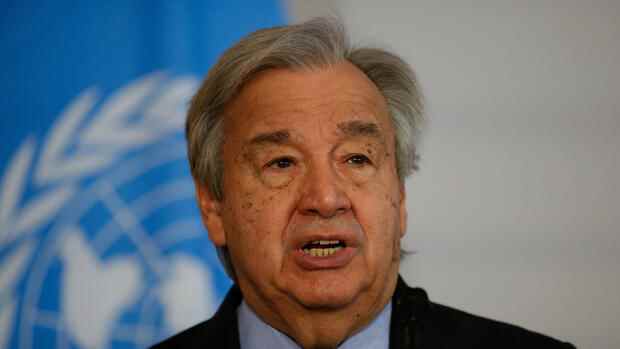The UN chief sees geopolitical tensions at a new high.
(Photo: AP)
new York In view of numerous crises worldwide, UN Secretary-General António Guterres has warned of the increasing risk of nuclear annihilation. The world is in a “time of nuclear danger not seen since the height of the Cold War,” Guterres said on Monday at the start of the Nuclear Non-Proliferation Treaty (NPT) review conference in New York.
“Humanity is in danger of forgetting the lessons forged in the terrible fires of Hiroshima and Nagasaki,” the UN Secretary-General warned. The world is just one misunderstanding or miscalculation away from nuclear annihilation.
Guterres said on Monday that geopolitical tensions had reached a new high – citing Russia’s war against Ukraine, conflicts in the Middle East, the Korean Peninsula and crises with “nuclear overtones”. “Competition trumps cooperation and collaboration. Distrust has replaced dialogue. Disunity has replaced disarmament.”
During his appearance in New York, US Secretary of State Antony Blinken accused Russia of using nuclear weapons to make ruthless threats of war. Earlier statements by Kremlin chief Vladimir Putin that military aid could have unprecedented consequences for Ukraine were “dangerous nuclear saber-rattling,” Blinken said at the conference.
Top jobs of the day
Find the best jobs now and
be notified by email.
The statements are contrary to international agreements. “There is no place in our world for nuclear deterrence based on force and intimidation or blackmail. We must stand together to reject this.”
Blinken also said the United States would only consider using nuclear weapons in extreme circumstances to defend the vital interests of the United States, its allies and partners.
>> Read here: Baerbock is fighting for nuclear disarmament in New York – and is still openly pessimistic
The Treaty on the Non-Proliferation of Nuclear Weapons (NPT), which is more than 50 years old and to which 191 countries have joined, forms the basis for nuclear disarmament worldwide. It states that only the US, Russia, China, France and the UK can have nuclear weapons. The other four suspected nuclear powers India, Pakistan, Israel and North Korea have either not joined the treaty or have withdrawn from it.
The aim of the treaty is to prevent the proliferation of nuclear weapons, promote nuclear disarmament and promote the peaceful use of nuclear energy. A review is planned every five years to determine the extent to which the goals of the Non-Proliferation Treaty have been met.
The tenth review conference was supposed to take place in 2020, but was postponed due to the corona pandemic. The conference now runs until August 26th.
More: Nuclear Weapons Conference: The new fear of the bomb
